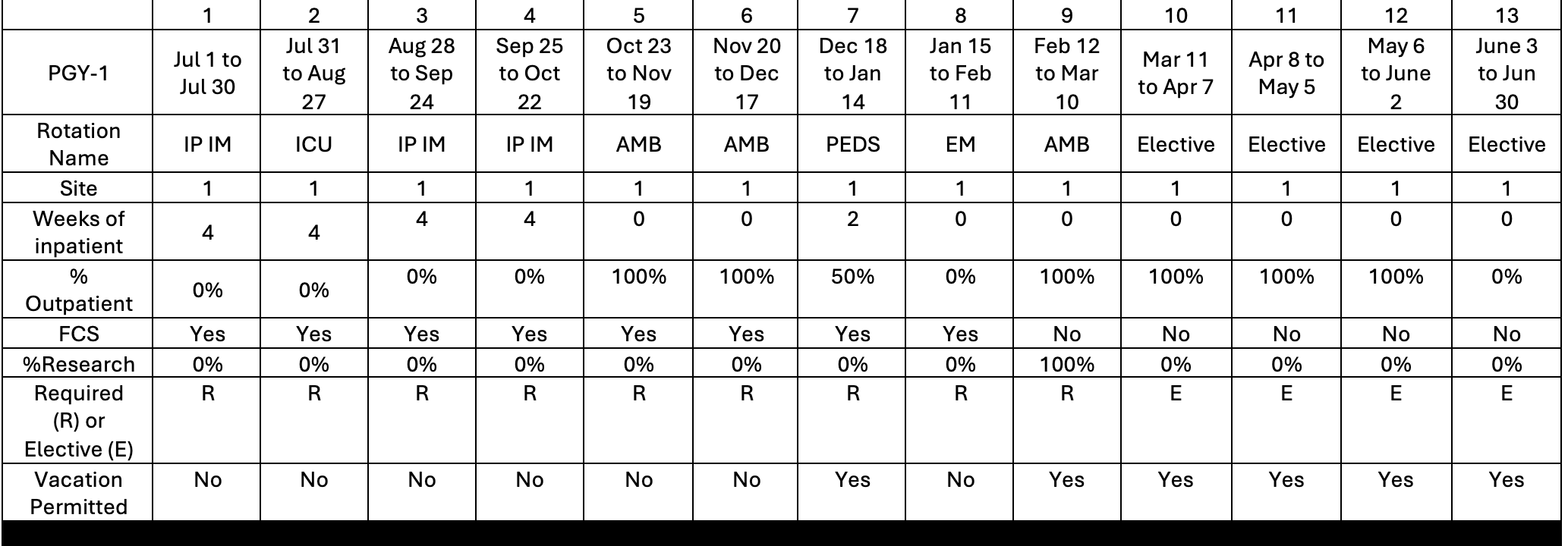
Curriculum
![]()
The Transitional Year Residency Program has been designed to fulfill the Accreditation Council for Graduate Medical Education (ACGME) competencies in:
Patient Care
- Medical Knowledge
- Interpersonal and Communication Skills
- Professionalism
- Practice-Based Learning and Improvement
- Systems-Based Practice
Residents will gain clinical exposure and experience through a wide variety of hospital-based and ambulatory rotations, complemented by comprehensive didactics presented by residents, core faculty, and subspecialists. ACGME clinical and educational work hour regulations will be strictly followed in order to help maintain patient safety and resident well-being.
The curriculum offers a balanced learning environment within various inpatient and outpatient settings. The majority of the core rotations will take place at Cape Coral Hospital, and ambulatory and elective rotations will give residents experience in various clinics throughout the Cape Coral/Ft. Myers communities. Our newly constructed (September 2025) continuity clinic is just a few miles away from the Cape Coral Hospital and will give residents the clinical experience of having their own patient panel and focusing on preventive health and acute and chronic multi-system disease management. The newly constructed simulation center will offer residents a forum to practice various procedures and hone skills in a comfortable environment, including a point-of-care ultrasound (POCUS). Residents will use mock codes and standardized patient encounters as part of the available methods for simulation training.
Our program will promote research and scholarly activity and provide many resources for involvement in research and independent learning. Residents will participate in a scholarly elective rotation and will also be involved in quality improvement projects in both the inpatient and outpatient settings.
Frequent and effective feedback from faculty tracking resident ACGME milestone and competency progress will be a key component of all clinical rotations.
The diverse patient population at Cape Coral Hospital and the surrounding community will expose residents to both bread and butter internal medicine and more complex pathology and diagnosis.
Educational Conferences
Noon Conference Lecture Series
The core curriculum lecture series is held at noon every Monday, Tuesday, Thursday, and Friday. Each year, the series begins with coverage of common medical emergencies (Intern Boot Camp lectures), from July to September. For the remainder of the year, the conference series covers core topics in internal medicine. Faculty presenting this conference are encouraged to make the discussions cases-based and interactive. This series will also include lectures on neurology, psychiatry, orthopedics, ophthalmology, pain management, dermatology, sleep medicine, wellness, and a variety of other topics. On the first Friday of each month, the noon conference will be a meeting between residents and program leadership (PD/APD/Chief resident) to discuss ongoing issues and concerns.
Journal Club
A resident-led Journal Club is held once a month on Monday afternoons. All PGY levels are required to participate. On a regular basis, recent articles from major medical journals are discussed in detail under the direction of the chief medical residents and one of the faculty.
Morning Report
All PGY levels are required to participate. It is held twice a week and facilitated by faculty and a chief resident. For PGY-1, discussion is aimed at refining presentation skills, and development of a complete, prioritized differential diagnosis.
Grand Rounds
This conference is attended by all PGY levels and held at least once a month. Speakers include both visiting and local faculty.
Morbidity and Mortality Conference
Morbidity and Mortality Conference is held twice a month on Wednesday afternoons. All PGY levels are required to participate. Residents will present patients who expired or had unexpected complications. Teaching points and learning opportunities are emphasized by the presenting resident, faculty, and program director.
Educational Goals
To provide a broad-based program of graduate medical education in multiple clinical disciplines designed to facilitate the choice of and preparation for a specialty or in preparation for general medical practice.
Resources
All Internal Medicine Residents will be provided $2500 annual CME allotment, $750 monthly housing subsidy, $500 reimbursement for personal computer, $8,000 reimbursement for certain relocation expenses, program payment of USMLE/COMLEX Step 3 fees, PTO days (4 weeks vacation), ACP membership, State of Florida licensure fees, two lab coats, business cards, fitness center available/discount, free parking, meals while on duty, physician and resident lounge access, free confidential counseling services through Lee Health EAP, and full access to the extensive Florida State College of Medicine medical library, as well as Lee Health learning platform, including UpToDate.

FSU Lee Health Transitional Year Residency Program Block Schedule (13, 4 Week Block Model)
Site 1: Cape Coral Hospital
Rotation Name Legend:
IP IM - In-Patient Internal Medicine
AMB - Ambulatory (140 hours IM, FM, OB or Gen Surg outpatient clinic)
ICU - Intensive Care Unit
PEDS - Pediatrics
EM - Emergency Medicine
RES - Research
QI - Quality Improvement
FM - Family Medicine
Electives:
- Cardiology
- Dermatology
- Endocrinology
- Gastroenterology
- Hematology Oncology
- Neurology
- Ophthalmology
- Otolaryngology
- PM&R
- Radiology
- Radiation Oncology
- Vacation: Four weeks per year (28 days)
Simulation
Point of Care Ultrasound (POCUS)
We aim to train well-rounded, highly competent and skilled internal medicine physicians, aware of the technologically advancing tools being utilized in the field for diagnosis and patient care. Point of care ultrasound (POCUS) is a part of this spectrum of care. It has a wide array of applications that enhance diagnostic ability, procedural safety and efficiency. We believe that offering this curriculum will provide another opportunity to improve the overall strength of our program and the quality of physicians trained through this program.
The simulation workshops happen in a small group format (residents are divided based on the clinic groups they belong to) and will occur on Friday afternoons every 4th week for each resident group). All participants need to consent in simulation activities. The idea is to create high fidelity environment, where residents will master the skills and receive immediate feedback, with an accent on pre- and de-briefing.
The equipment used is developed by CAE: Vimidex (Cardiac ultrasound mannequin), Athena (high fidelity mannequin) and Blue phantom (procedure trainer).
Contact Us
![]()

Patty Innamorato
Program Manager
Email: patty.innamorato@med.fsu.edu
708 Del Prado Blvd., Suite 1
Cape Coral, FL 33991
Phone: (239) 424-2000, Ext 70601 (admin assistant)
Fax: (239) 424-2052

